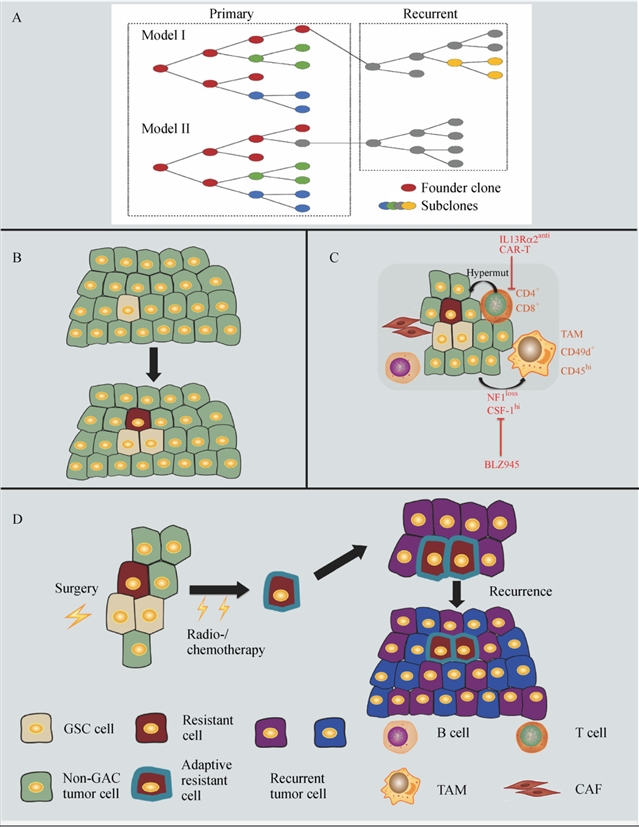|
|
| FMD | 前沿研究:肿瘤内异质性和微环境促进脑胶质瘤耐药、复发与进展的机制研究 |
|
论文标题:Intratumor heterogeneity, microenvironment, and mechanisms of drug resistance in glioma recurrence and evolution(肿瘤内异质性和微环境促进脑胶质瘤耐药、复发与进展的机制研究)
期刊:Frontiers of Medicine
作者:Zhaoshi Bao, Yongzhi Wang, Qiangwei Wang, Shengyu Fang, Xia Shan, Jiguang Wang, Tao Jiang
发表时间:23 Sep 2021
DOI:10.1007/s11684-020-0760-2
微信链接:点击此处阅读微信文章

导 读
首都医科大学附属北京天坛医院、北京市神经外科研究所保肇实和江涛等在Frontiers of Medicine发表综述《肿瘤内异质性和微环境促进脑胶质瘤耐药、复发与进展的机制研究》(Intratumor heterogeneity, microenvironment, and mechanisms of drug resistance in glioma recurrence and evolution)。
脑胶质瘤是成人最常见的颅内肿瘤,致死率、致残率高,为社会和患者家庭带来沉重负担。原发性4 级脑胶质瘤患者的中位生存期仅为14.6 个月。虽然手术、放化疗已经几乎成为脑胶质瘤的标准治疗,但患者预后仍较差,原因可能与尚需进一步研究探索的肿瘤内异质性和免疫微环境有关。近年来免疫微环境逐渐成为肿瘤治疗的可能方向,诞生了诸如PD1/PDL1抑制剂、肿瘤疫苗等治疗方法。但因为颅内肿瘤细胞周围微环境和体部肿瘤不同、有其特异性的微环境细胞,且存在血脑屏障,针对脑胶质瘤微环境的免疫治疗遭遇瓶颈。

摘 要
脑胶质瘤是最常见的中枢神经系统致死性肿瘤。世界卫生组织对中枢神经系统肿瘤的分类将脑胶质瘤分为低级别胶质瘤和胶质母细胞瘤。与通常在老年人中发生的原发性胶质母细胞瘤(WHO 4级,pGBM)不同,富含异柠檬酸脱氢酶(IDH)突变的继发性胶质母细胞瘤(WHO 4级,sGBM)通常在诊断后5-10年内从低级别进展至高级别。基于克隆和亚克隆改变带来的各种进化轨迹,脑胶质瘤的进化模式根据不同的理论而不同。一些重要的特征将正常大脑与其他组织区分开来,例如,肿瘤细胞周围微环境的组成,血脑屏障的存在等。脑胶质瘤复发的潜在机制和其进化模式与其他类型肿瘤不同。多项研究将肿瘤复发与肿瘤异质性和免疫微环境相关联。然而,脑胶质瘤进展和复发的详细原因仍存在争议。本文介绍了脑胶质瘤进展的不同机制,包括肿瘤异质性、肿瘤微环境和耐药性,以及它们在临床试验中的临床前应用。该综述旨在为复发性和继发性胶质瘤患者的进一步诊疗临床策略提供新的见解。
寄 语
希望能给读者提供全面的脑胶质瘤分子分型、机制和治疗方案的研究概述,为脑胶质瘤患者的精准治疗提供更好的医疗决策。
原文信息
标题
Intratumor heterogeneity, microenvironment, and mechanisms of drug resistance in glioma recurrence and evolution
作者
Zhaoshi Bao, Yongzhi Wang, Qiangwei Wang, Shengyu Fang, Xia Shan, Jiguang Wang, Tao Jiang
机构
1. Beijing Neurosurgical Institute, Capital Medical University, Beijing 100050, China
2. Department of Neurosurgery, Beijing Tiantan Hospital, Capital Medical University, Beijing 100050, China
3. Divison of Life Science, Department of Chemical and Biological Engineering, Center for Systems Biology and Human Health, and State Key Laboratory of Molecular Neuroscience, TheHong KongUniversity of Science and Technology,Hong Kong, China
4. China National Clinical Research Center for Neurological Diseases, Beijing 100050, China
5. Division of Life Science,Hong KongUniversity of Science and Technology,Hong Kong, China
6. Center of Brain Tumor, Beijing Institute for Brain Disorders, Beijing 100069, China
7. Department of Radiotherapy, Beijing Tiantan Hospital, Capital Medical University, Beijing 100050, China
Corresponding AuthorTao Jiang
Cite this article
Zhaoshi Bao, Yongzhi Wang, Qiangwei Wang, Shengyu Fang, Xia Shan, Jiguang Wang, Tao Jiang. Intratumor heterogeneity, microenvironment, and mechanisms of drug resistance in glioma recurrence and evolution. Front. Med., 2021, 15(4): 551?561https://doi.org/10.1007/s11684-020-0760-2
https://journal.hep.com.cn/fmd/EN/10.1007/s11684-020-0760-2
https://link.springer.com/article/10.1007/s11684-020-0760-2
摘要
Glioma is the most common lethal tumor of the human brain. The median survival of patients with primary World Health Organization grade IV glioma is only 14.6 months. The World Health Organization classification of tumors of the central nervous system categorized gliomas into lower-grade gliomas and glioblastomas. Unlike primary glioblastoma that usually develop de novo in the elderly, secondary glioblastoma enriched with an isocitrate dehydrogenase mutant typically progresses from lower-grade glioma within 5–10 years from the time of diagnosis. Based on various evolutional trajectories brought on by clonal and subclonal alterations, the evolution patterns of glioma vary according to different theories. Some important features distinguish the normal brain from other tissues, e.g., the composition of the microenvironment around the tumor cells, the presence of the blood-brain barrier, and others. The underlying mechanism of glioma recurrence and evolution patterns of glioma are different from those of other types of cancer. Several studies correlated tumor recurrence with tumor heterogeneity and the immune microenvironment. However, the detailed reasons for the progression and recurrence of glioma remain controversial. In this review, we introduce the different mechanisms involved in glioma progression, including tumor heterogeneity, the tumor microenvironment and drug resistance, and their pre-clinical implements in clinical trials. This review aimed to provide new insights into further clinical strategies for the treatment of patients with recurrent and secondary glioma.
点击左下角蓝色“阅读原文”, 可下载全文,了解更多内容。 感谢作者对Frontiers of Medicine的信任和支持。
《前沿》系列英文学术期刊
由教育部主管、高等教育出版社主办的《前沿》(Frontiers)系列英文学术期刊,于2006年正式创刊,以网络版和印刷版向全球发行。系列期刊包括基础科学、 、工程技术和人文社会科学四个主题,是我国覆盖学科最广泛的英文学术期刊群,其中13种被SCI收录,其他也被A&HCI、Ei、MEDLINE或相应学科国际权威检索系统收录,具有一定的国际学术影响力。系列期刊采用在线优先出版方式,保证文章以最快速度发表。
中国学术前沿期刊网
http://journal.hep.com.cn

特别声明:本文转载仅仅是出于传播信息的需要,并不意味着代表本网站观点或证实其内容的真实性;如其他媒体、网站或个人从本网站转载使用,须保留本网站注明的“来源”,并自负版权等法律责任;作者如果不希望被转载或者联系转载稿费等事宜,请与我们接洽。